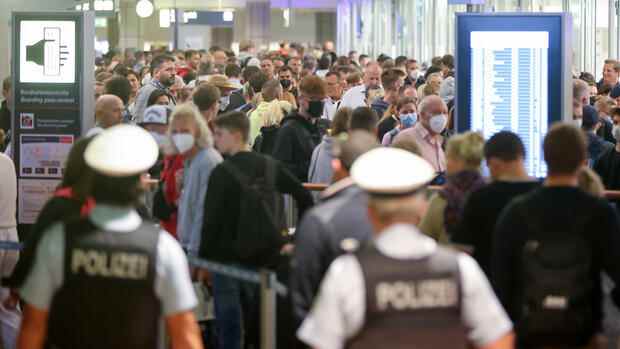Dusseldorf Too late, too slow, not extensive enough – the German government’s permission on Wednesday to recruit 2,000 helpers in Turkey to combat the airport chaos in Germany met with little approval in business circles and in the opposition.
“The chaos had been apparent for a long time,” criticized Anja Karliczek, tourism policy spokeswoman for the CDU/CSU parliamentary group, in an interview with the Handelsblatt. “Then why does the federal government and the ministries involved need more than five weeks to get approval for recruiting the 2,000 employees from Turkey?”
The delay is now at the expense of the millions of tourists who have been queuing for hours at Germany’s airports for weeks. In addition, the CDU politician criticizes that the ministries have apparently failed to approach domestic temporary work agencies.
In fact, the bottleneck had been announced for a long time. 15,500 of the 119,500 employees in airline and airport operations had turned their backs on the industry since the pandemic began, the federal government has now reported in response to a small inquiry from the CDU/CSU parliamentary group. The answer is available to the Handelsblatt. The German Economic Institute (IW) also calculates that there is a shortage of 7,200 skilled workers at Germany’s airports.
Top jobs of the day
Find the best jobs now and
be notified by email.
At the same time, there are “no more reserves on the labor market” to fill these gaps in air and ground personnel, according to the IW. In Berlin/Brandenburg, for example, the US carmaker Tesla has swept the job market empty, industry experts report. In addition, there are currently extremely high sick leave rates at the airlines due to the Omicron variant of Corona.
Passengers alerted the police
There can therefore hardly be any talk of an easing of the situation at Germany’s airports, which many tour operators were still hoping for a few days ago. The airlines canceled numerous flights again on the second weekend of the summer holidays in North Rhine-Westphalia. Lufthansa also announced that it would be canceling a further 2,200 summer flights at the Frankfurt and Munich hubs after 900 take-offs and landings had already been cancelled. The subsidiary Eurowings also removed several hundred flights from the system in the summer, as did the low-cost airline Easyjet.
The TV broadcaster NTV reported at Cologne-Bonn Airport that there was a three-kilometer queue in front of the security check that stretched to the front of the airport building. In the previous week, Ryanair passengers had even alerted the police there at the airport. The pilot had informed the passengers who were trapped in the plane after multiple flight postponements that the start to Mallorca had now finally been cancelled. Unfortunately, you can’t reach anyone when the bus is ready to drive the holidaymakers back to the airport building.
The Federal Government’s statement on the dilemma sounds correspondingly disturbing. “It is not necessary to upgrade the airport infrastructure to cope with the number of passengers,” she said in her answer to the small question.
Berlin also doesn’t want to know anything about speeding up the approval of security staff. “Exceptions or simplifications in the case-by-case assessment as part of aviation security background checks are not being considered by the BMI,” the letter reads.
At the same time, the federal government is doing away with the assumption that a lack of financial incentives could have caused the shortage of staff. That was what Verdi Vice and Lufthansa Supervisory Board member Christine Behle claimed a few days ago. “According to the Federal Employment Agency, the gross median salary of full-time employees subject to social security contributions in the aviation industry was 4,413 euros per month at the end of 2020,” says the answer to the small inquiry. In security clearance, the Handelsblatt learned from employees there, the hourly wage is usually over 20 euros.
The bottleneck is caused by the high demands on the job, as the federal government writes in its statement. In many areas of application at airports, a qualification as an aviation security assistant is required, which is demanding. “Out of 20 applicants, only three managed to get hired,” an employee of the Swissport handling company at Cologne/Bonn Airport reported a few days ago to the Handelsblatt.
This week, the travel agency association VUSR sent the CDU/CSU parliamentary group a whole catalog of measures against the chaos at Germany’s airports. The travel experts there are demanding that the outsourcing of security checks to external companies must come to an end. “The overall sovereign task should again be the task of the federal police.”
Association suggests improvement measures
There is also no lack of concrete suggestions for improvement in the paper. According to the association, airlines that only offer a few flights at airports should check in through the airport operator in the future. Such counters would have to be permanently manned to avoid long queues before departure.
In addition to online check-in, the use of automatic baggage machines must also be used more intensively – ones that can be used universally by all airlines. For passengers without hand luggage, the VUSR requires a fast lane at the security checkpoint.
The pressure on the airlines should also be increased: “Airlines must be legally obliged that the luggage is in the possession of the passenger one hour after landing,” says the list of demands. “Otherwise the airline will be obliged to deliver it later.”
All of this could soon find its way onto the political agenda. “This week we submitted an application,” reports CDU tourism expert Karliczek. It calls for the convening of a special travel summit with the participation of the responsible federal ministers by September at the latest. “It is important to develop a long-term viable concept in order to prevent such chaos at airports in the future,” she says.
More: Flight chaos causes a heated debate on the Lufthansa board
